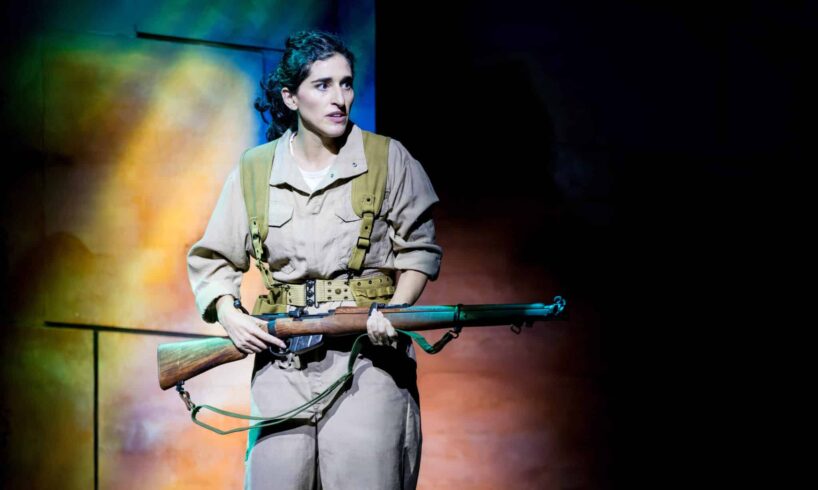
During Jennifer Apple’s first professional gig, a few people walked out — though not because of her performance. She was starring in “Spring Awakening” in Wichita, Kansas, a show known for its raw themes of sexuality, repression, and teenage rebellion.
“There were a number of young fans who were sobbing and thanked us so much because they felt as though they had been seen,” Apple told Unpacked. “But we also had some people who walked out.”
These days, no one’s heading for the exits. Apple has been captivating audiences at Theatre Row in Manhattan with her performance in “Hannah Senesh,” produced by the National Yiddish Theatre Folksbiene and running until November 9. Though performed in English, the one-woman play channels the spirit of Senesh — the Hungarian-born Jewish poet, paratrooper, and resistance fighter who was executed by the Nazis at age 23.
“Hannah Senesh” tells her remarkable true story of leaving the safety of British Mandate Palestine in 1944 to help rescue Jews during the Holocaust. Through diary entries, letters, and poetry, the play traces Senesh’s journey from idealistic kibbutznik to resistance fighter, culminating in her capture, imprisonment, and tragic death. Told largely through Senesh’s own words, the production explores themes of courage, faith, and moral conviction.
On stage, Apple embodies both Senesh and her mother, shifting between the two with a mix of searing ferocity and quiet grace. As Senesh, she delivers a line that haunts the play: she “took a roll of the dice and lost.”
“She was definitely one of the most badass, for sure,” Apple said with a laugh.
Who was Hannah Senesh?
Hannah Senesh (also known as Hannah Szenes) was born in Budapest, Hungary, in 1921, and emigrated to British Mandate Palestine in 1939. Four years later, she joined the British army as a paratrooper. A gifted poet, she is best known for her haunting work “Eli, Eli” (“My God, My God”).
After she was captured by Hungarian authorities, a British transmitter was found in her possession. Despite being tortured, Senesh refused to reveal any information. She was executed by firing squad in 1944 at the age of 23, after being found guilty of treason.
In the play, Apple lets out a blood-curdling scream that jolts the audience, followed by a brief yet beautiful moment of song. She convincingly portrays both Senesh and her mother, capturing their anguish and resilience with striking precision.
The challenge of becoming Hannah Senesh
Portraying Hannah Senesh is no small feat — emotionally, spiritually, or technically. The one-woman show runs for 90 minutes, with Apple shifting seamlessly between Senesh and her mother, often without a pause to breathe.
“The memorizing,” Apple said. “It was not like we had a long rehearsal process. I marry my physicality and my voice to the words in space. It’s 90 minutes. It’s a lot. So that was the hardest part.”
Jennifer Apple in “Hannah Senesh”
For Apple, the challenge wasn’t just recalling pages of dialogue; it was embodying Senesh’s courage and emotional depth in real time. Each movement and inflection carries weight, a story of faith, defiance, and sacrifice told entirely through her voice and body.
The result is a performance that feels both intimate and monumental — a living portrait of a young woman who refused to stay silent.
From Tevye’s Daughter to Dina’s Café
While performing as Tzeitel in a stage production of “Fiddler on the Roof” in Pennsylvania, Jennifer Apple experienced a moment she’ll never forget. In the scene where Tevye gives his blessing for Motel and Tzeitel to marry, the couple celebrates just before launching into the song “Miracle of Miracles.”
“You know when you’re a kid and you hold on to a friend and you both lean back and you both spin?” she asked. “That was the choreography. My Motel accidentally spun me the wrong way. I heard a little pop, and that was a little injury.”
Apple received an injection, worked with a chiropractor, and turned to hot yoga for recovery.
The experience didn’t slow her down, but rather it strengthened her resolve to take on more demanding and meaningful roles. She proudly notes that she later originated the role of Anna in the First National Tour of the Tony Award–winning “The Band’s Visit,” where she famously screamed in Hebrew while on roller skates.
Jennifer Apple
“The Band’s Visit” began as an Israeli film starring Ronit Elkabetz as Dina, a cynical café owner in the desert town of Beit Hatikvah. On Broadway, the role was later brought to life by Katrina Lenk and others. The story centers on an unexpected connection and coexistence between Israelis and Egyptians — a quiet, human tale of empathy across divides.
Apple began preparing for her own portrayal of Dina in Boston, performing with the Huntington and Speakeasy Stage Company. Her first day of rehearsal came at an especially charged moment — just two days after Hamas attacked Israel.
“My first day of rehearsal was October 9, 2023,” she said. “I was playing this Israeli woman in a very liberal town. It’s a show that is not inherently political, but by having Israelis and Egyptians just talking like people, it somehow seemed radical. That’s why the show is such a success. To be able to do so as a Jewish person was profound. To be recognized for my performance and that particular show at that time was a real, real privilege.”’
Apple’s performance earned her the 2024 Elliot Norton Award for Outstanding Lead Performance in a Musical. She also played Dina in the show’s national tour, bringing the role — and its message of shared humanity — to audiences across the country.
Where values meet art
Apple said she attended Jewish day schools.
“My passion, my value system, I learned from the Torah, from the community, and my families,” Apple said. “’Vahavta l’reacha kamocha, bikur cholim and tikun olam,’ or ‘love thy neighbor as thyself, visit the sick and make a change to cause the world to be a better place.’ It was always a part of my daily living.”
Jennifer Apple
Living in New York City, Apple decided to pursue her Master’s degree in Fine Arts at the prestigious American Conservatory Theater in San Francisco, also known as ACT. There, she said, she gained not only confidence but a wide range of tools — from breathing techniques to learning how to use her physicality on stage.
Apple has been singing since childhood and has even dabbled in stand-up comedy. Her television credits include appearances on “New Amsterdam” and “Law & Order: Special Victims Unit.”
After portraying some of the most iconic Jewish women on stage, Apple is still searching for a role that feels entirely her own.
“I don’t if it’s written yet,” Apple said. “It would be akin to Emmy Rossum’s role on Shameless.”
She was referring to Fiona Gallagher, the character Rossum played — a young woman holding together a chaotic household of siblings with no responsible parents on the Showtime series. “It’s funny, it’s sexy, it’s dark, it’s gritty,” Apple said. “There’s no pretense other than someone who is really present, having to navigate conflict with real humanity and emotional depth.”
Beyond performing, Apple is also an acting coach and teacher. She helps students prepare monologues for school auditions and professional roles, and regularly leads masterclasses across the country. During the pandemic, she adapted her work to an online format, continuing to mentor aspiring performers virtually.
Apple founded The Empowered Artist Collective, an incubator program offering panels and workshops for women and nonbinary individuals in the performing arts. The initiative aims to foster community, mentorship, and professional growth in an industry that often feels isolating.
She also hosts The Empowered Artist Collective Podcast, which recently wrapped its third season. The show provides practical insight into the entertainment world while challenging common myths and misconceptions about the industry.
“The mission is to have conversations people are not having and hopefully give people insight into different parts of the industry they might not have known to be possible,” she said.





